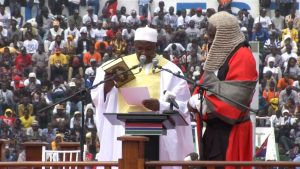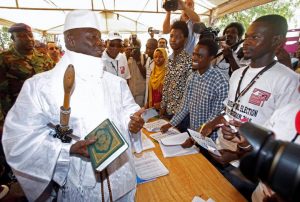[vc_row][vc_column][vc_column_text]

The tensions that followed the historic electoral defeat of Gambia strongman President Yahya Jammeh has been a litmus test for democracy in Africa beyond the tiny West African nation.
It is five years since the African Charter on Democracy, Elections and Governance came into force.
When it was adopted there were high hopes for a new democratic Africa. African leaders sought to consolidate a collective commitment to promote democratisation. The adoption of the charter was seen as an important step towards the AU’s democratic agenda.
The charter set out five ways in which heads of state could hold onto power that would constitute unconstitutional changes of government and, by implication, threaten democratic processes.
The five are: coups, mercenary interventions, replacement of democratically elected governments by armed dissidents or rebels, refusal by an incumbent to relinquish power, and constitutional revisions that infringe democratic processes.
But political developments in parts of Africa have left much to be desired with respect to the realisation of the charter.
For a while it seemed that The Gambia was doomed to follow suit. Instead, it has become an important democratisation success story.
Jammeh eventually stepped down, thanks to pressure from Ecowas. He went without a single shot being fired.
Barrow, his democratically elected successor, has committed himself to transforming the country into a thriving democracy after two decades of dictatorship.
So what lessons can be learnt from the Gambia which other parts of Africa can emulate? This article highlights three mutually reinforcing lessons: inward evolution, strong coalitions and sub-regional pressure.
Inward evolution

The first key factor that propelled the Gambian electoral outcome was the need for change led by Gambians themselves.
The Gambia had once been the drafting home of the African Human Rights Charter. But under Jammeh it gained international notoriety for human rights violations.
The economy plummeted and unemployment soared. Thousands of Gambians fled. Many chose to take the perilous journey across the Mediterranean Sea in the hope of reaching Europe.
Gambians began to recognise the need to reassess the direction the country was going in. Political rhetoric for change began to ring loudly. This was amplified on social media platforms through hashtags such as #GambiaDecides and #FreeGambia.
This mobilisation for change based on the belief in democratic values eventually resulted in a re-calibration of the political system through the ballot box.
This drive for change is what propelled the Arab Spring in countries such as Tunisia, Libya and Egypt. What was different in The Gambia was that organised political structures were set up. It was through these that the Barrow-led coalition won the election.
Strong coalition
History has shown that strong coalitions are useful speedboats for democratic change. This is particularly true in countries where governance structures have been woven around a dominant order.
In Africa, coalitions have been shown to be effective and useful in a number of countries. These include Nigeria and Senegal.
A coalition of four major political parties in Nigeria propelled the wheels of change in the 2015 General Elections leading to the defeat of former incumbent President Jonathan’s Peoples Democratic Party in the presidential election.
In Senegal, Sall’s Benno Bokk Yakaar coalition won a landslide victory in parliament against Wade’s Senegalese Democratic Party in the 2012 elections.
In the Gambian case, the seven party coalition against the Jammeh-led Alliance for Patriotic Reorientation and Reconstruction proved to be a powerful force.
Aside from the coalition, a third driver of the Gambian victory was the sub-region’s commitment to the democratic process.
Sub-regional pressure
Regionalism is a powerful and efficient force because it locates political diplomacy within countries that have strong socio-political and economic ties.
While the pressures exerted by the United Nations and African Union were crucial to the Gambian process, the efforts by Ecowas were the most effective.
In Africa, sub-regional institutions such as Ecowas and the East African Community have been very effective in promoting economic integration and human rights. As active inter-governmental institutions, their role in the democratic narrative cannot be underestimated.
Only time will tell if the continent as a whole will learn from the Gambian experience. What’s important to emphasise is that African democratisation lies in the will of its people and institutions.
If the Gambia is to become an exemplar of African democratisation, the new administration under Barrow must do three things. First, it must live up to its democratic commitment. Second, it must undo the damage that’s been done by the erstwhile regime. Third, it must set the country on a path to peace and prosperity.
About the author:
Romola Adeola is Steinberg Postdoctoral Fellow in International Migration Law at the Centre for Human Rights and Legal Pluralism, Faculty of Law, McGill University, writing this article for theconversation.com[/vc_column_text][/vc_column][/vc_row][vc_row top_margin=”none”]
[/vc_row][vc_row top_margin=”none” full_width=””][/vc_row][vc_row top_margin=”none”][/vc_row][vc_row top_margin=”none”][/vc_row][vc_row top_margin=”none”][/vc_row]


Be the first to comment